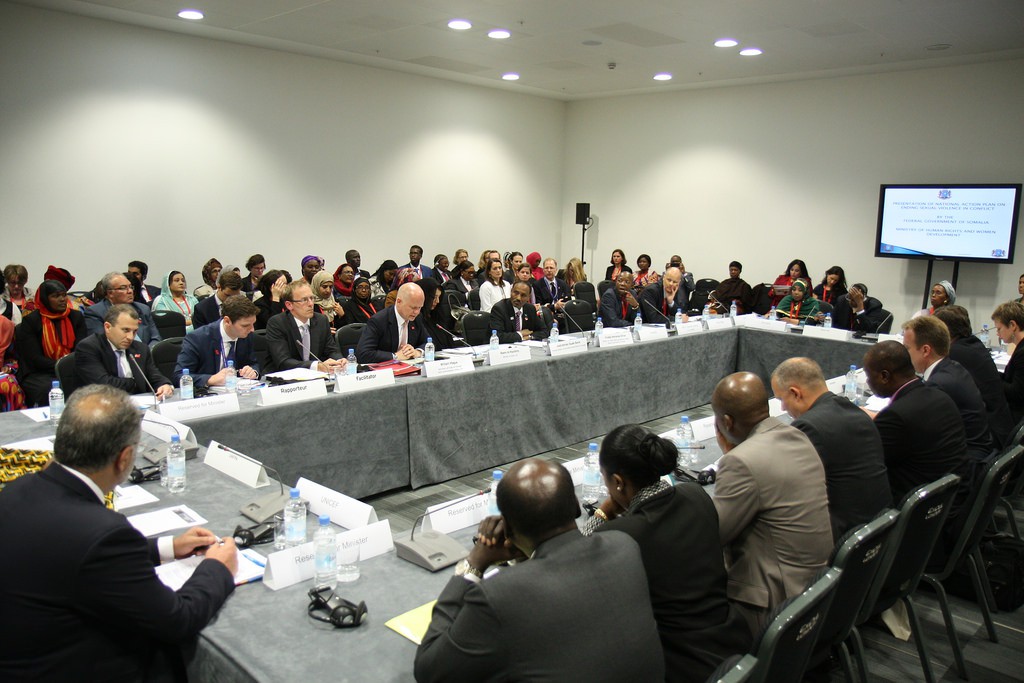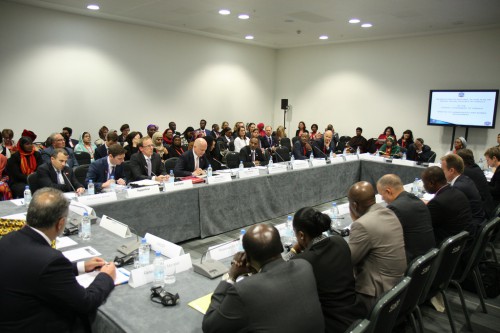19th June 2014
Reflections of a Catholic participant on the Global Summit to End Sexual Violence in conflict


I have commented in recent weeks on the 10-13 June London Summit to End Sexual Violence in Conflict. This week, I give the floor to Pádraic MacOireachtaigh, Jesuit Refugee Service Regional Advocacy and Communications Officer in the Great Lakes based in Burundi, who participated in the Summit, and who contributes his own supportive but critical commentary on the event.
Hosted by Secretary of State William Hague and actress and Special Envoy for the UNHCR Angelina Jolie, last week’s Global Summit in London took upon itself the impressive task of ending sexual violence in conflict. Armed with the ubiquitous hashtag #TimeToAct, the summit aimed to create “irreversible momentum” that will help, in the words of Jolie, to “apply our protective instinct to the world’s most vulnerable people.”
More debate
While the consensus is that more action needs to be seen, we must not neglect the opportunity to continue the conversation. Indeed, this is not a single discussion, nor a straightforward issue to be instrumentalised by governments or NGOs or any one sector.
There is an open need for more debate: less meaningless repetition of the self-evident, and more space to challenge the assumptions that have fuelled our varied responses. Only then can we move beyond the binaries of perpetrator/victim, conflict/peacetime, international community/local partners, and so on.
In this regard, then, I hope that the summit may prove a fruitful launch pad for further fora. Perhaps embassies, who organised parallel events last week, could host follow-up summits at regional levels. This will be especially effective if local voices have a greater say.
Complicating the narrative
In defying the impossibility of the task at hand, most of the summit’s impressive roster of speakers went on to deny its complexity too.
The summit was at its finest when space was allowed to present counter-narratives, deepen the discourse, and explore facets of ‘the issue’ that generally receive less attention. Chris Dolan and Gary Barker, for example, offered insights into working with male survivors of sexual violence. This requires, most fundamentally, a deeper discussion about changing gender norms: advocacy focussing not only on ‘concrete results’ but also on attitudinal shifts. Other figures would have done well to include more gender-neutral language consistently throughout.
Despite these opportunities to complicate the narrative, however, tired stereotypes were continually reaffirmed. Jolie presented the issue in the old, emotive dichotomy of ‘us’ and ‘them’. The summit could have been a real opportunity to challenge misconceptions, instead of reinforcing them. Survivors were often paraded instead of engaged.
So we must be careful in targeting our ‘awareness-raising’ and hold the media accountable for the damage of lazy reporting. To do this, we must work to promote new narratives, preserve the dignity of every human being, and continually affirm the complexity and uniqueness of any situation.
Do no harm
Throughout the summit, politicians repeated the mantra that we must ‘end impunity’ with language such as Zainab Bangura’s “we will pursue you; there is no hiding place: we will get you.”
Ban Ki-Moon was more nuanced, encouraging us to “work together towards a vision of the world free of sexual violence in conflict.” Sexual violence is not an isolated issue; improving understanding of it and its underlying causes requires a more holistic and multifaceted response.
We must be careful that Jolie’s exhortation to “drive up the number of prosecutions” does not result in more arbitrary convictions. In seeking ever better data, we must recognise that confidentiality, transparency, and the highest possible standards of professionalism will be our touchstones. And we must acknowledge the damaging effects of our need to seek constantly for survivor testimonies.
Careful reform
In pushing for reforms and progress, we cannot conflate ‘sexual violence in conflict’ into a single issue requiring a neatly-crafted response. We need to diversify our conversations and recognise that while global momentum is a powerful tool to champion a cause, what is more important is careful and measured analysis of extremely complex and diverse contexts and phenomena.
At the centre of these analyses should be not only women and survivors, but entire communities. Only in this way can we acknowledge the far-reaching causes and consequences of sexual violence.
To start, let us remove the hierarchical implications of ‘centres of power’ versus ‘on the ground.’ If this initiative truly seeks to be global, we must address the inherent inequities of Western-led initiatives pouring money into what is framed as a scourge of the Global South.
Hague was right to admit that “foreign policy is no longer the sole preserve of governments.” And yet the summit’s emphasis on institutional commitments further reified power structures already at play. This was summed up most sharply by the voice of a male survivor from Bosnia: “I don’t know the structure of this event, I don’t know who you are. But I want the powerful people to understand.”
Only connect
It is as a catalyst that the summit may prove most effective.
Despite notable absences and pockets of underrepresentation, many diverse stakeholders were gathered in the same place. More substantial work could have been achieved, but the side conversations and new encounters remain the event’s most valuable aspect.
By dynamising the network of engaged actors, we may spark fresh conversations and thoughtful responses to build on the efforts of those who have been working tirelessly for generations already. There are millions of small steps ahead of us if we wish to effectively implement our good intentions.
Sexual violence, in conflict or otherwise (the distinction is largely unhelpful), will not be banished with a programme nor with a resolution. In the words of Robert Kennedy, quoted by Australia’s Chief of Army David Morrison in the final plenary, “it is from the numberless diverse acts of courage and belief that human history is shaped.” Of these acts, we would do well to accept that this summit was but one.